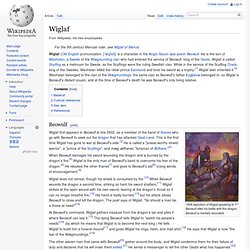

Beowulf (hero) Beowulf (/ˈbeɪ.ɵwʊlf/; Old English: [ˈbeːo̯wʊlf]) is a legendary Geatish hero and later turned king in the epic poem named after him, one of the oldest surviving pieces of literature in the English language.
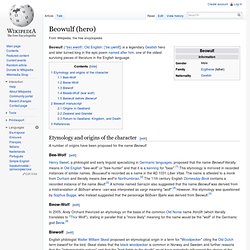
A number of origins have been proposed for the name Beowulf. Henry Sweet, a philologist and early linguist specializing in Germanic languages, proposed that the name Beowulf literally means in Old English "bee-wolf" or "bee-hunter" and that it is a kenning for "bear".[1] This etymology is mirrored in recorded instances of similar names. Biuuuwulf is recorded as a name in the AD 1031 Liber Vitae. In 2005, Andy Orchard theorized an etymology on the basis of the common Old Norse name Þórólfr (which literally translates to "Thor Wolf"), stating in parallel that a "more likely" meaning for the name would be the "wolf" of the Germanic god Beow.[4] Scholars have long debated about the origins of the character Beowulf. The event when Onela was slain was probably a historic event. Hroðgar. Queen Wealhþeow serving Hrothgar (background, centre) and his men.
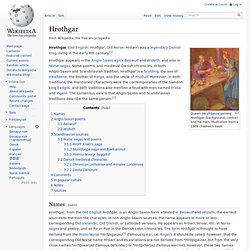
Illustration from a 1908 children's book. Hrothgar (Old English: Hroðgar; Old Norse: Hróarr) was a legendary Danish king, living in the early 6th century.[1] Hrothgar appears in the Anglo-Saxon epics Beowulf and Widsith, and also in Norse sagas, Norse poems, and medieval Danish chronicles. In both Anglo-Saxon and Scandinavian tradition, Hrothgar is a Scylding, the son of Healfdene, the brother of Halga, and the uncle of Hroðulf.
Moreover, in both traditions, the mentioned characters were the contemporaries of the Swedish king Eadgils; and both traditions also mention a feud with men named Froda and Ingeld. Names[edit] Anglo-Saxon poems[edit] Beowulf[edit] When Hrothgar is first introduced[5] in Beowulf, it is explained that he was the second of four children of King Healfdene: he had an older brother, Heorogar, who was king before him; a younger brother Halga; and a sister, who was married to the king of Sweden. Hrólfr Kraki. Hrólfr Kraki spreading gold to escape the Swedes, by Jenny Nyström (1895).
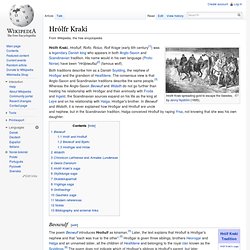
Hrólfr Kraki, Hroðulf, Rolfo, Roluo, Rolf Krage (early 6th century[1]) was a legendary Danish king who appears in both Anglo-Saxon and Scandinavian tradition. His name would in his own language (Proto-Norse) have been *Hrōþiwulfaz[2] (famous wolf). Both traditions describe him as a Danish Scylding, the nephew of Hroðgar and the grandson of Healfdene. The consensus view is that Anglo-Saxon and Scandinavian traditions describe the same people.[3] Whereas the Anglo-Saxon Beowulf and Widsith do not go further than treating his relationship with Hroðgar and their animosity with Froda and Ingeld, the Scandinavian sources expand on his life as the king at Lejre and on his relationship with Halga, Hroðgar's brother.
Hygelac. Hettergouw at the lower Rhine, inhabited by the Attoarii or Hetware, who killed Hygelac, according to Beowulf, line 2916.
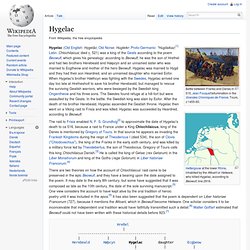
Hygelac (Old English: Hygelāc; Old Norse: Hugleikr; Proto-Germanic: *Hugilaikaz;[1] Latin: Chlochilaicus; died c. 521) was a king of the Geats according to the poem Beowulf, which gives his genealogy: according to Beowulf, he was the son of Hrethel and had two brothers Herebeald and Hæpcyn and an unnamed sister who was married to Ecgtheow and mother of the hero Beowulf. Hygelac was married to Hygd and they had their son Heardred, and an unnamed daughter who married Eofor.
When Hygelac's brother Hæthcyn was fighting with the Swedes, Hygelac arrived one day too late at Hrefnesholt to save his brother Herebeald, but managed to rescue the surviving Geatish warriors, who were besieged by the Swedish king Ongentheow and his three sons. The Swedes found refuge at a hill-fort but were assaulted by the Geats. In the battle, the Swedish king was slain by Eofor.
G. Hugleik. Unferð. Etymology[edit] Unferth's name can be understood in a number of ways.
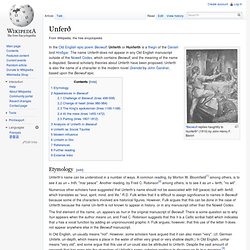
A common reading, by Morton W. Bloomfield[1] among others, is to see it as un + frith, "mar peace". Another reading, by Fred C. Robinson[2] among others, is to see it as un + ferth, "no wit". Numerous other scholars have suggested that Unferth’s name should not be associated with frið (peace) but with ferhð, which translates as “soul, spirit, mind, and life.”
Wiglaf. Wiglaf (Old English pronunciation: [ˈwiɣlɑf]) is a character in the Anglo-Saxon epic poem Beowulf.
